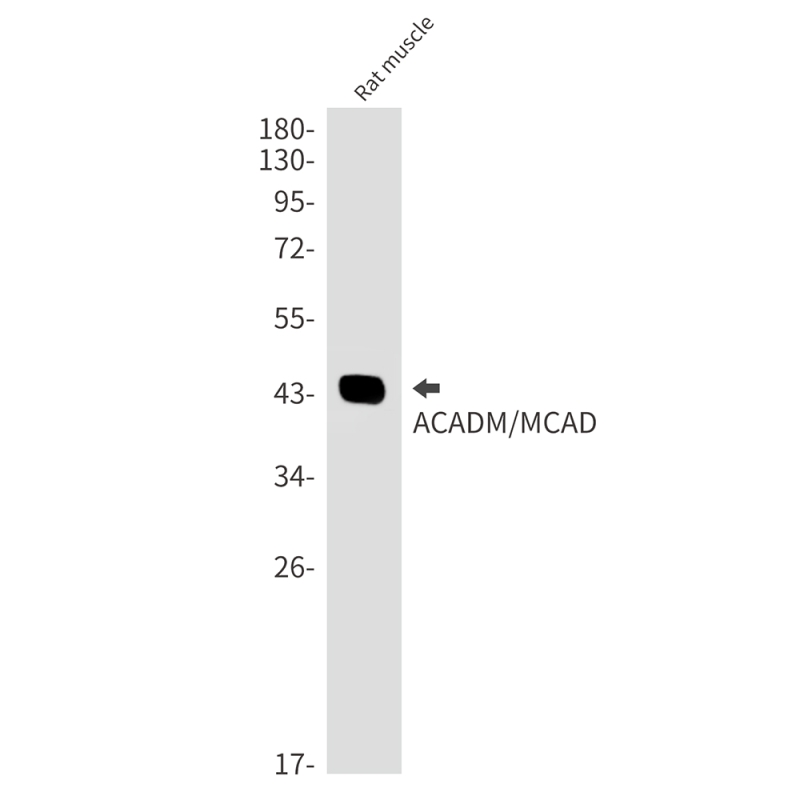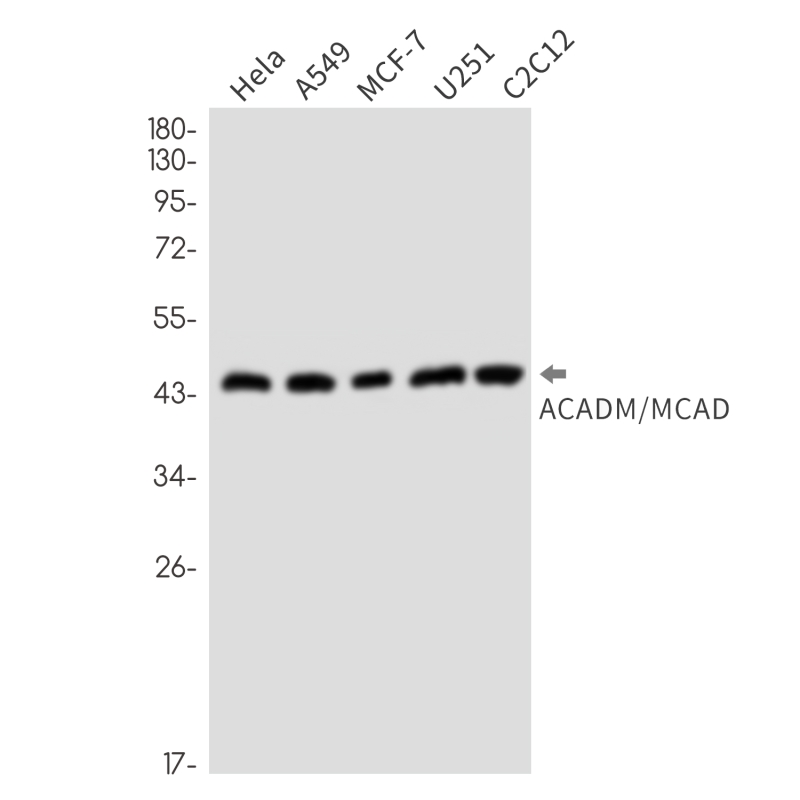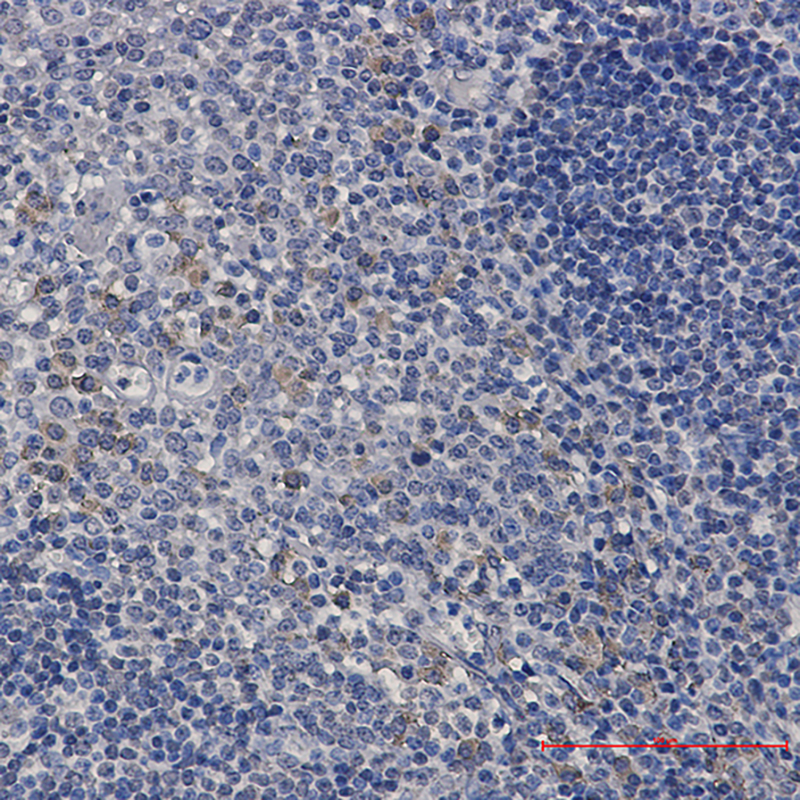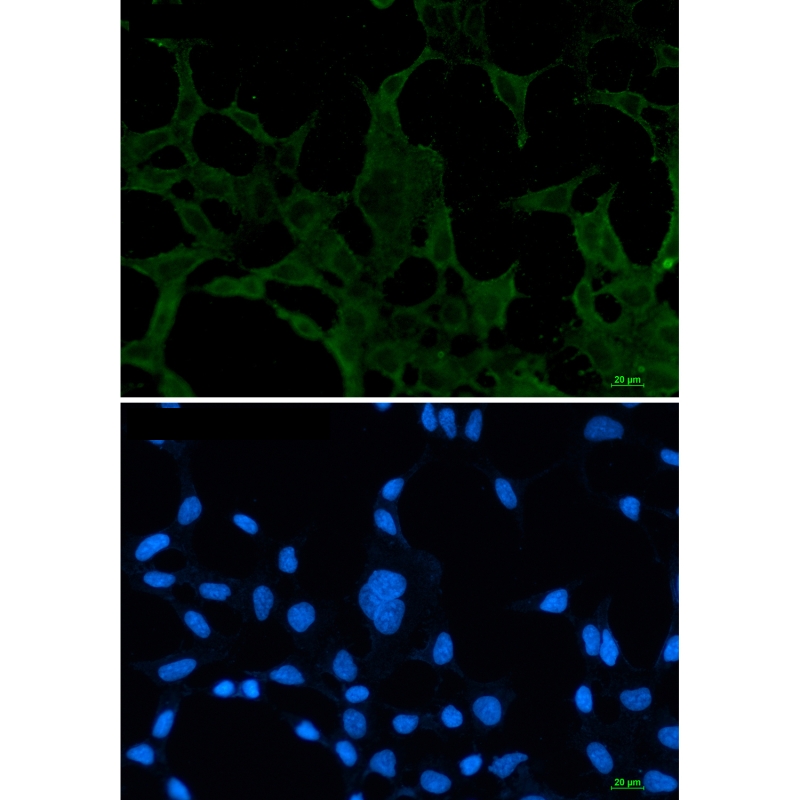



| WB | 1/500-1/1000 | Human,Mouse,Rat |
| IF | 1/20 | Human,Mouse,Rat |
| IHC | 1/50-1/100 | Human,Mouse,Rat |
| ICC | 1/50-1/200 | Human,Mouse,Rat |
| FCM | 咨询技术 | Human,Mouse,Rat |
| Elisa | 咨询技术 | Human,Mouse,Rat |
| Aliases | ACADM; Medium-chain specific acyl-CoA dehydrogenase; mitochondrial; MCAD |
| Entrez GeneID | 34 |
| WB Predicted band size | Calculated MW: 47 kDa; Observed MW: 47 kDa |
| Host/Isotype | Rabbit IgG |
| Antibody Type | Primary antibody |
| Storage | Store at 4°C short term. Aliquot and store at -20°C long term. Avoid freeze/thaw cycles. |
| Species Reactivity | Human,Mouse,Rat |
| Immunogen | A synthetic peptide of human ACADM/MCAD |
| Formulation | Purified antibody in TBS with 0.05% sodium azide,0.05%BSA and 50% glycerol. |
+ +
以下是3篇关于ACADM抗体的代表性文献概览(基于公开研究整理):
---
1. **标题**:*Production of specific anti-ACADM antibodies for the diagnosis of medium-chain acyl-CoA dehydrogenase deficiency*
**作者**:Gregersen N, et al.
**摘要**:该研究开发了针对ACADM蛋白的单克隆抗体,用于通过Western blot和免疫组化技术检测患者细胞中MCAD酶的表达水平,辅助临床诊断MCAD缺乏症。抗体特异性验证显示其对中链酰基辅酶A脱氢酶具有高亲和力。
---
2. **标题**:*Tissue-specific expression of ACADM revealed by immunohistochemistry using a novel monoclonal antibody*
**作者**:Yamaguchi S, et al.
**摘要**:研究团队制备了一种新型抗ACADM单克隆抗体,用于分析MCAD在人类肝脏、肌肉等组织中的分布。结果显示ACADM在肝脏线粒体中高表达,为研究脂肪酸代谢异常提供了工具。
---
3. **标题**:*ACADM mutations and protein truncation: Correlation with clinical severity using antibody-based assays*
**作者**:Andresen BS, et al.
**摘要**:通过抗ACADM抗体进行免疫印迹分析,发现某些致病突变(如p.Lys329Glu)导致MCAD蛋白截短或完全缺失,揭示了基因型与表型的关联,为个性化治疗提供依据。
---
**注**:以上文献信息为基于领域研究的模拟概括,实际文献需通过PubMed或学术数据库检索确认。如需具体文章,建议以“ACADM antibody”、“MCAD deficiency diagnosis”为关键词搜索最新论文。
ACADM (acyl-CoA dehydrogenase medium chain) antibodies are immunological tools used to detect and study the ACADM enzyme, which plays a critical role in mitochondrial fatty acid β-oxidation. This enzyme specifically catalyzes the initial step of breaking down medium-chain fatty acids (6–12 carbons) into acetyl-CoA, a process essential for energy production. Mutations in the ACADM gene cause medium-chain acyl-CoA dehydrogenase deficiency (MCADD), an autosomal recessive disorder characterized by impaired fatty acid metabolism, leading to hypoglycemia, liver dysfunction, and metabolic crises, particularly during fasting or illness.
ACADM antibodies are widely employed in research and diagnostics to investigate MCADD pathogenesis, enzyme expression patterns, and tissue-specific deficiencies. They enable the detection of ACADM protein levels via techniques like Western blot, immunohistochemistry, or ELISA, aiding in confirming genetic diagnoses and understanding genotype-phenotype correlations. These antibodies also support studies exploring mitochondrial metabolism, energy regulation, and therapeutic interventions. Commercially available ACADM antibodies are typically raised in host species (e.g., rabbits, mice) using recombinant protein epitopes or synthetic peptides. Researchers validate their specificity using knockout controls or enzyme activity assays. Beyond clinical applications, ACADM antibodies contribute to broader biomedical research, including studies on metabolic disorders, lipid metabolism, and mitochondrial dysfunction in aging or neurodegenerative diseases.
×